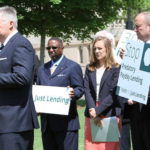WASHINGTON (RNS)—Seven score and four years ago, Abraham Lincoln stood on the steps of the U.S. Capitol and said North and South alike must suffer for the sin of slavery.
“If God wills that (the war) continue until … every drop of blood drawn with the lash shall be paid by another drawn with the sword, so it still must be said ‘the judgments of the Lord are true and righteous altogether,’” Lincoln said in his second inaugural address, quoting the Psalms.
Called “Lincoln’s Sermon on the Mount,” his 1865 address has been deemed the most religiously sophisticated presidential speech in American history. And it was delivered by a backwoods lawyer with just one year of formal schooling who never joined a church.
|
The famous Lincoln Window at New York Avenue Presbyterian Church in Washington, D.C., depicts Abraham Lincoln, who attended the church but never joined. (PHOTO/RNS/David Jolkovski)
|
As the 200th anniversary of Lincoln’s birth approaches on Feb. 12, the 16th president and his unconventional faith continue to inspire and to confound. Churches, community centers and colleges across the country are celebrating the bicentennial by pondering Lincoln’s words.
Meanwhile, a raft of recent books attempts to restore religion to historical accounts of Lincoln’s life after a generation of scholars shrugged off his spiritual side.
“I call it the presence of an absence,” said Ronald C. White Jr., author of A. Lincoln, a biography published in January that aims to restore the missing pieces of Lincoln’s “spiritual odyssey.”
“People don’t deal with his religion. It is the great hole in our study,” White said in an interview.
Lincoln didn’t make things easy for historians. He was reticent and often inscrutable about his personal faith. Moreover, his ideas changed over time, as he dealt with the deaths of two sons and the pressure of the presidency amid the Civil War.
Most historians agree on this much: Lincoln never was baptized, never joined a church, and rarely, if ever, talked about Jesus.
Sign up for our weekly edition and get all our headlines in your inbox on Thursdays
"Not a technical Christian"
“He was a religious man always,” said Lincoln’s widow, Mary, after his death, “but he was not a technical Christian.”
That hasn’t stopped every stripe of believers from claiming honest Abe as one of their own. Spiritualists, atheists, Christians and even Jews have all tried to cast Lincoln as a member of their tribe as well.
“Sometimes the battles over these things are rather sharp, very sharp as a matter of fact,” Dewey Wallace, a professor of religious history at George Washington University, told a conference of religion reporters last fall. Like the Jesus Seminar, the academic search for the “historical Jesus,” scholars endlessly sift through each chapter of Lincoln lore, Dewey said.
Ironically, the man who became one of the most religious American presidents had little use for faith as a young man, according to historians. Mocking the emotional sermons of the evangelical preachers who blazed across the frontier, Lincoln often angered his pious Baptist father.
Political handicap
When Lincoln ran for Congress against one of those preachers, Methodist circuit rider Peter Cartwright, in 1846, his early apostasy became a political handicap. To fight a whispering campaign that he was an “infidel,” Lincoln published a handbill denying that he was “an open scoffer at Christianity.”
“That I am not a member of any Christian Church, is true,” Lincoln wrote.
“But I have never denied the truth of the Scriptures; and I have never spoken with intentional disrespect of religion in general, or any denomination of Christians in particular.”
Despite his doubts, Lincoln had great respect for the Bible, one of the few books his parents possessed. He memorized large portions of it and consulted the book often in later years as he struggled with the “mere quiet power” of God.
Still, Lincoln never joined a church. Some say he just wasn’t a “joiner.” Others argue he couldn’t abide by complicated creeds. Many agree Lincoln wasn’t the type to open himself to the spiritual scrutiny often expected of church members.
“He was a very private man,” biographer David Herbert Donald said. “And not likely to get up in front of a congregation and say, ‘Let me recite the sins I have committed.’”
Growing spirituality
Nevertheless, when Lincoln’s son Edward died in 1850, he turned to a Presbyterian pastor for answers. “Why did God take my son?” he asked Pastor James Smith of Springfield, Ill., at the beginning of their friendship.
Lincoln had a similar relationship with Phineas Gurley, pastor of New York Avenue Presbyterian Church in Washington, where the president occasionally attended services. Lincoln wrote that his faith began to crystallize at this time, and White argues that bits of Gurley’s sermons can be found in the president’s speeches, including his famed second inaugural address.
Both Presbyterian churches Lincoln attended preached predestination and the sovereignty of God, a belief he inherited from his Baptist parents and held in one form or another for most of his life. Broadly put, it means God, not man, is in charge.
It was the source of Lincoln’s humility, historians say—the force behind his refusal to condemn enemies.
“Lincoln believed God was the author of his life and history,” said Jack Van Ens, a Presbyterian pastor, historian and actor.
“God drew out the plot and allowed Lincoln to punctuate the sentences.”













We seek to connect God’s story and God’s people around the world. To learn more about God’s story, click here.
Send comments and feedback to Eric Black, our editor. For comments to be published, please specify “letter to the editor.” Maximum length for publication is 300 words.